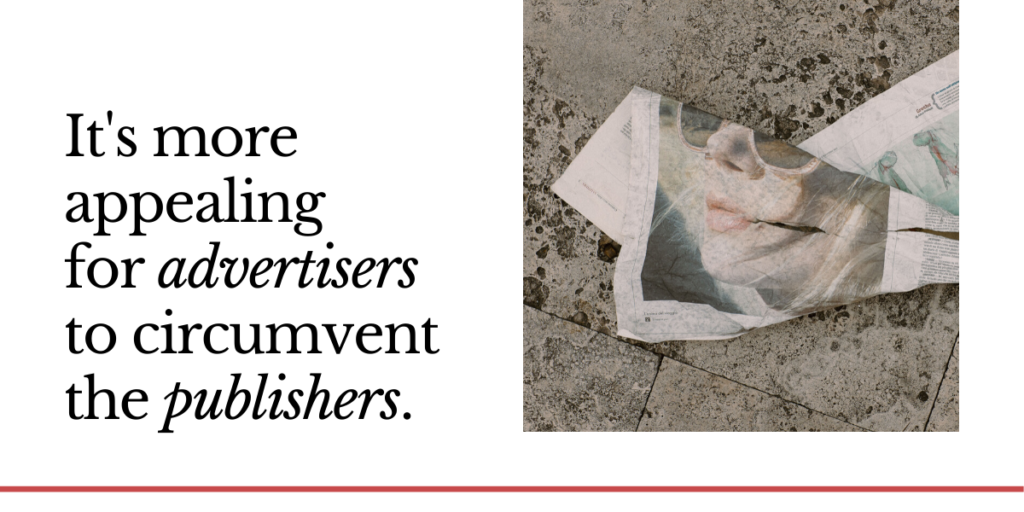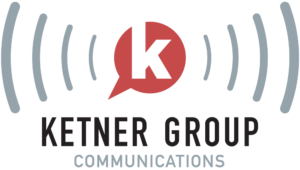The future of journalism will be defined by two parallel forces: algorithms and trust.
Online media has been in constant evolution since print newspapers and periodicals first moved online.
Industry innovation since then has mainly delivered new ways to cover and share news: podcasts; webinars; video; social media.
But the non-stop battle for readers and revenue never disrupted the fundamental business model of publishing. Outlets continue to generate revenue through either subscription-based or ad-supported coverage.
More recently, powerful new forces have put this model into question – one slowly and one suddenly. The response will define who maintains their positions as the gatekeepers of information moving forward.
Big Tech is poaching ad revenues
One major financial burden for digital publishers is Big Tech. Google and Facebook, in particular, have built their own news distribution and advertising platforms that offer larger audiences and more personalization options.

It’s a natural if not inevitable evolution. Newspapers and periodicals curated and distributed great writing to a broader audience than the writers could reach alone. Big Tech simply does the same at a greater scale. It curates the best of the best for the biggest audience.
The publishing industry model has always financially rewarded the organizations with the biggest audiences and best ROI for advertisers. Big tech now wears that crown.
In response, many of the biggest publishers are lobbying to require tech companies to pay for the news they use. This would provide some relief for content producers but doesn’t address the competitive disadvantage of the model itself. It’s a band-aid option that prevents the industry from addressing larger issues at hand.
Money flowed from inefficient print newspapers to online publications because it delivered a better user experience and better ROI for advertisers. Even if regulators force Big Tech to share revenue with publishers, the same forces will continue to disrupt the online news industry from within.
The pandemic effect
The throes of a pandemic offer a fascinating glimpse into the true state and future of media and journalism.
Decision-makers and stakeholders need answers, guidance and insight into the factors influencing their livelihoods and lifestyles. That’s why many reliable publishers are experiencing huge surges in web traffic and engagement.
In a vacuum, this would be a harbinger of a revenue windfall.
However, the pandemic has led many brands to cut back on their ad buys with publications. This has resulted in a slew of media layoffs and furloughs, a cruel irony at a time when public interest in consuming content is high and the need is great.
Ultimately, a protracted pandemic and its economic fallout will accelerate the trends already underway. Ownership groups will consolidate risk, stack premier writing talent within fewer publications and double down on making sure those few outlets maintain profitability – at the expense of the rest.
The industry will get more top-heavy.
A symbiotic relationship
Although the pandemic will continue inflicting pain on the publishing industry, it eventually will come to an end. Similarly, Google and Facebook aren’t in the business of putting media out of business. In fact, it’s the worst thing they could do.
These tech platforms can’t – and don’t want to – create their own content. They prefer to identify and elevate the best content for each audience. Their algorithms do just that. And that’s why they’re so successful.
In a way, big tech is bringing rigid order to the Wild West of online publishing. They are the new gatekeepers of ‘good journalism’. And for better or worse, they don’t define winners subjectively. Behavior and preference data and search ranking algorithms leave no room for those who don’t follow the rules.
The role of trust in an open internet
There is another important factor working in publishers’ favor: platforms have issues of their own when it comes to policing their pages. Facebook especially has been battered by the fake new phenomenon.
In an unregulated and open internet, trust comes at a premium. Ethical publishers will have a monopoly on trust that advertisers and brands will gravitate towards.
This does not mean that all online publishers will recoup the revenues they pulled in before big tech stole the show. Rather, well-defined and highly loyal audiences will continue to rely on digital publishers who exemplify those characteristics.
A new playing field defines the future of journalism
The importance and role of high-value content are the same as they have ever been. In fact, with questions about fake news and overt bias running rampant, it’s more critical to media sustainability than ever.
Publishers are just operating on a new playing field where new referees have reset the rules.
This game, like any game, will have winners and losers. But the players who create the best content for their audience’s needs will forever have a key role in defining the future of journalism. And readers and advertisers will reward them for it.

